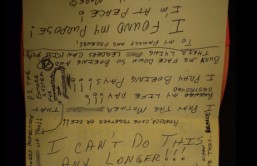During a Zedd concert Wednesday night at Boston's House of Blues, three people reportedly overdosed on forms of MDMA, including 19-year old college student Brittany Flannigan, who died after allegedly taking Molly, the Boston Globe reports. As police investigate the seemingly unrelated overdoses, the club is currently closed.
The three victims of overdose were rushed to the Beth Israel Deaconess Hospital after the show ended at around 12:15 a.m., and authorities tell the Boston Globe that they believe they were all unrelated incidents, though all of them were in the same age range. The two victims of overdose who were in their 20s, including a 24-year old, survived but were left in serious condition, while Flannigan, who was a sophomore at Plymouth State University in New Hampshire, died soon after being admitted.
Flannigan's sister told the Daily Mail that this was the first concert Brittany had ever been to, and sadly it was also her last. In response to the tragic events, Zedd tweeted his condolences and urged his fans to stay safe and "be responsible," while Live Nation, the company that owns the club and promoted the concert, issued the following statement: "One individual has unfortunately passed away and our thoughts go out to their family and friends for their loss. This matter is under investigation and we are continuing to working with local officials."
PLEASE, everyone... BE RESPONSIBLE!
— Zedd (@Zedd) August 28, 2013
Love and respect to those in pain right now. Our hearts go out to you. — Zedd (@Zedd) August 28, 2013
Out of respect to the families and friends involved in last night's tragic loss, the show in Boston tonight is canceled. — Zedd (@Zedd) August 28, 2013
Police told WBZ-TV that they believed the three young adults had overdosed on Molly, a pure, often powdered form of the club drug MDMA (ecstacy). Robert Merner, commander of the Boston Police Department's Drug Control Unit, explained to the Boston Globe that when mixed with alcohol, Molly can be extremely potent, though investigators are still looking into which particular drugs the victims took that night.
"My understanding is that there is a potential that we are talking about Molly,'' Merner said to the Globe over the phone, adding that it's a popular choice of drug for teens and young adults who attend techno and electronica music events. "The problem is that it raises body temperature, heartbeat, and causes severe dehydration. If you decide to choose alcohol over water to quench your thirst while you're on it, the alcohol leads to dehydration, too, so it increases that problem."
According to Rita Nieves, director of the addictions bureau of the Boston Public Health Commission, MDMA and its various forms account for less than 1 percent of overdose cases in Boston, though due to the rising number of college students coming into the city for music events, she said that it's important to raise awareness on the drugs' potential dangers.
"When you're in a club and buy something from someone, you really don't know what you're putting into your body," Nieves told the Boston Globe. "All of a sudden, you're not in charge anymore."
Anthony Pettigrew, spokesman for the US Drug Enforcement Administration, said to the Globe that despite the rareness of Molly-related deaths, the street drug is still dangerous, as much as what is being sold in clubs as "pure" is not.
"When people take it, they assume it's pure, but they don't know what's in it," he said. "We're talking about stuff that people are manufacturing in their bathtubs. People who use should realize there is no way to know what is in it."
The Boston Herald reports that two pink pills were found in pockets of the 24-year old victim, while a bag of white powder was discovered hidden in her bra. She will be summoned by the district court on drug charges, according to police spokesman David Estrada, and a police report claims the woman struggled "violently" with the hospital staff.
Click here to watch a video report on the drug-related concert incident that left two people in critical condition and one young woman dead.








